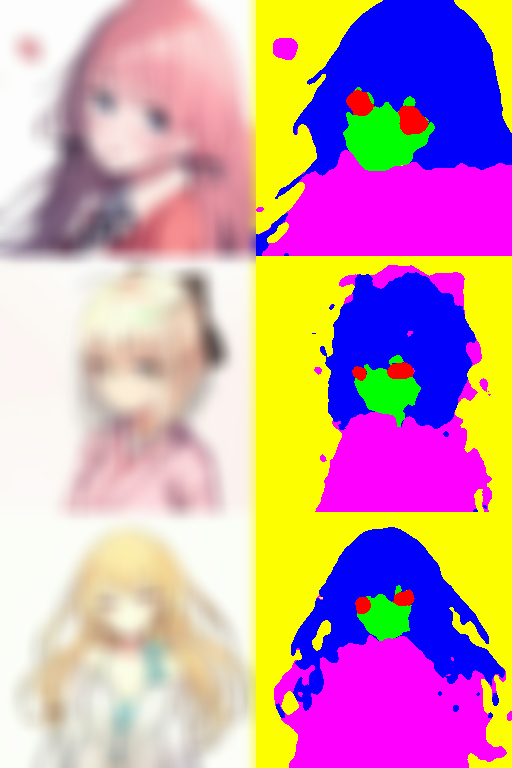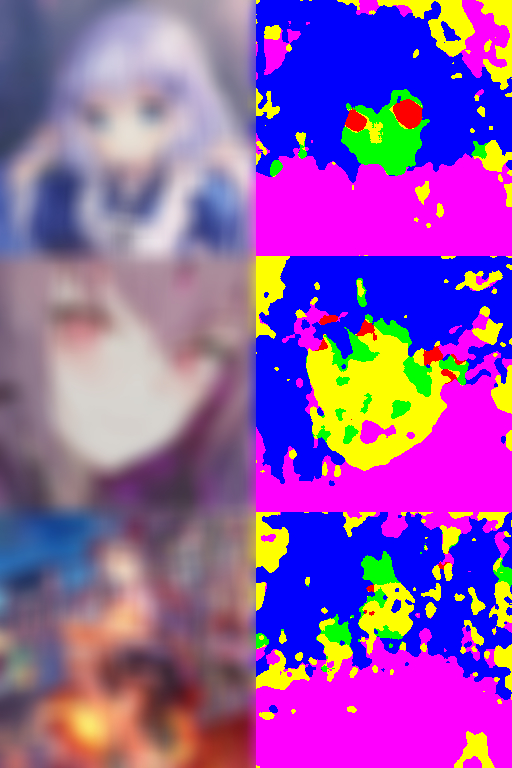Anime-Semantic-Segmentation-GAN
Method
This architecture is based on arXiv:1802.07934, 2018 and its official code.
And this repository was implemented to perform semantic segmentation for pixiv anime illust.
GAN architectures are placed in generator.py and discriminator.py, training architecture are been updater.py or loss.py, and hyper-parameter is been options.py.
The details of this architecture exist my blog in Japanese.
Result

This result is obtained by training with Pretrained-ResNet101-DeepLab-v3 and it is output of unannotated anime illust.
Additionaly, parameters of the upper result is almost same as default value of options.py.
Fine cases (Simple, White background)

Failure cases (Complex, Non-white background, Full face image)

pretrained weights
I prepared pre-trained weights of Generator and Discriminator and added scripts in order to get these weights.
You can get them by executing a following command.
python get_pretrained_weight.py Totally about 200MB, so it may take a few minutes.
How to predict
If you want pre-trained model to predict, please do a next python script.
python predict.py predict.py creates predicted images from predict_from directory to predict_to.
In addition, sources are assumed 256 x 256 white-background png.
Sample
You are able to download a sample image from safebooru.org.
python get_sample_data.py How to train
Please create 'dataset' directory and prepare dataset. Next, you can set dataset path to option of command.
Example)
Python3 train.py --dataset_dir dataset/example --unlabel_dataset_dir dataset/unlabel_exampleEnvironment
| details | |
|---|---|
| OS | Windows10 Home 1909 |
| CPU | AMD Ryzen 2600 |
| GPU | MSI GTX 960 4GB |
| language | Python 3.7.1 |
| framework | Chainer 7.0.0, cupy-cuda91 5.3.0 |
References
[1] Huikai Wu, Junge Zhang, Kaiqi Huang, Kongming Liang, Yizhou Yu. FastFCN: Rethinking Dilated Convolution in the Backbone for Semantic Segmentation. arXiv preprint arXiv:1903.11816, 2019(v1)
[2] Ian J. Goodfellow, Jean Pouget-Abadie, Mehdi Mirza, Bing Xu, David Warde-Farley, Sherjil Ozair, Aaron Courville, Yoshua Bengio. Generative Adversarial Networks. arXiv preprint arXiv:1406.2661, 2014
[3] Jonathan Long, Evan Shelhamer, Trevor Darrell. Fully Convolutional Networks for Semantic Segmentation. arXiv preprint arXiv:1411.4038, 2015
[4] Liang-Chieh Chen, George Papandreou, Florian Schroff, Hartwig Adam. Rethinking Atrous Convolution for Semantic Image Segmentation. arXiv preprint arXiv:1706.05587, 2017 (v3)
[5] Liang-Chieh Chen, George Papandreou, Iasonas Kokkinos, Kevin Murphy, Alan L. Yuille. DeepLab: Semantic Image Segmentation with Deep Convolutional Nets, Atrous Convolution, and Fully Connected CRFs. arXiv preprint arXiv:1606.00915, 2017 (v2)
[6] Takeru Miyato, Toshiki Kataoka, Masanori Koyama, Yuichi Yoshida. Spectral Normalization for Generative Adversarial Networks. arXiv preprint arXiv:1802.05957, 2018
[7] Wei-Chih Hung, Yi-Hsuan Tsai, Yan-Ting Liou, Yen-Yu Lin, Ming-Hsuan Yang. Adversarial Learning for Semi-Supervised Semantic Segmentation. arXiv preprint arXiv:1802.07934, 2018 (v2)
[8] Wenzhe Shi, Jose Caballero, Ferenc Huszár, Johannes Totz, Andrew P. Aitken, Rob Bishop, Daniel Rueckert, Zehan Wang. Real-Time Single Image and Video Super-Resolution Using an Efficient Sub-Pixel Convolutional Neural Network. arXiv preprint arXiv:1609.05158, 2016